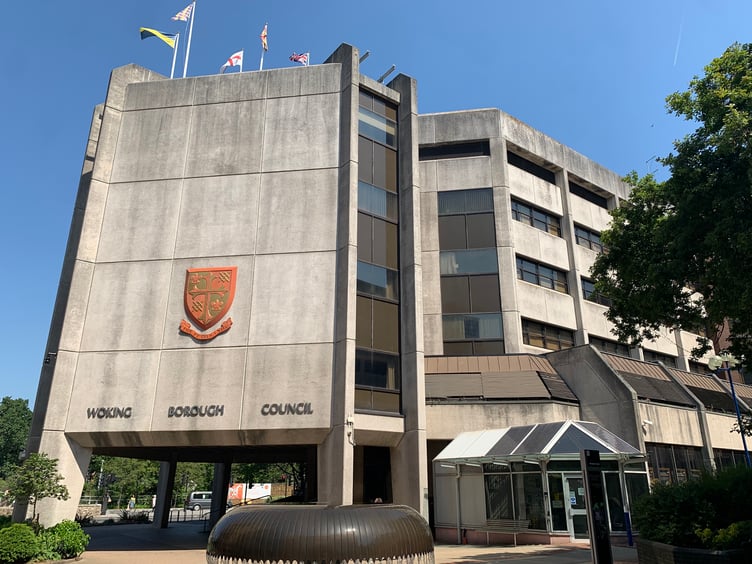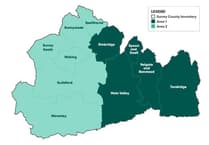Judgement day for Woking Borough Council services has been set.
The date for the axe to fall on non-statutory services at the bankrupt council was confirmed during a testy three and a half hour meeting last Thursday (July 20).
The road out of its £11 million annual budget shortfall, £1.2billion deficit and £2.6bm forecast debt will involve hundreds of council staff placed on notice of redundancy, council tax rises and huge 20 per cent increases in money from parking charges.
They will be hinged on 14 guiding principles that will underpin every decision the council makes going forwards.
The meeting began with an address from Woking Borough Council leader Ann-Marie Barker on where the authority was heading.
She said a recovery and improvement plan would be agreed upon and sent to the government in August, while the big date to keep an eye on was September 28.
Cllr Barker said: “That’s where we will need to take decisions on specific service changes.
“The September meeting will be informed by the public study we are doing on discretionary services and further consultation with staff and a budget.”
So far more than 3,000 people have taken part in the survey.
The process, she said, was to turn the ship around and become a “council that lives within its means’.
“We can’t solve Woking’s financial problems alone,” she said – and hoped councillors and officers could work together to find a solution to the “unprecedented debt levels”.
How it gets there, the mid-term financial strategy, was agreed by 22 councillors with none against – despite the flared tempers and finger pointing.
Short-term cuts to its annual budget will now begin in September with a wider suite of savings to follow in February.
The longer-term £1.2bn deficit, built on years of failed investments including the Victoria Square development and ThamesWey energy company, is another matter.
Cllr Dale Roberts said discussions with the Department of Levelling Up, Housing and Communities were “expected to begin in the weeks ahead”.
The government has told the council that any bailout would require the authority to demonstrate it had done everything in its power to raise income and cut spending.
Conservative opposition member, and chairperson of the overview and scrutiny committee, Cllr Josh Brown, said the report made for “sorry reading as a part of consequences that the council has been living beyond its means for many many years.”
He said he backed the timetable and was pleased special scrutiny sessions would be held – to ensure the administration could answer questions and revise the budget accordingly.
However, on plans to raise parking charges, he said: “I do have some concerns. The report states parking charges are assumed to rise by 20 per cent in 2024 and then a further ten per cent in the following years.
“I do fail to see how skyrocketing any parking charges will somehow increase revenue.
“People will simply stop parking. This will decimate our high street, potentially decimate our local business and I can’t see how plucking up a percentage out of thin air in the hope to increase revenue will work to increase revenue.
“I certainly hope this will not be the case following the parking review strategy due to come to council in autumn.”
Deputy leader Cllr Will Forster said: “The proposed parking increase is not a 20 per cent increase in individual parking charges.
“It’s about the budget envelope.
“To make our budget balance we need to raise 20 per cent more from parking to do that and there’s a parking strategy to look at what is the best way to do that.
“It’s very different from individual charges.”
Residents will be consulted on spending cuts worth up to £8.7million a year with a further £4m decided on a working level.
The council said it was looking to trim £11m from its budget and expects some of the potential cuts to not make it through the consultation process .
The 14 guiding principles Woking Borough Council will adopt
1 Fees and charges reviewed annually and adjusted for inflation, comparability, and competitiveness.
2 Vulnerable groups will be considered carefully.
3 Service level spend will be benchmarked regularly with a suitable peer group and proposals to align with the benchmark will be brought forward.
4 Digital-first service delivery but mindful of the risks of exclusion.
5 A rolling programme of service reviews to ensure operating models, organisational design and cost footprints are adjusted across the council.
6 Service developments, savings and investment will be brought forward and all business cases demonstrate feasibility, deliverability and appropriate financial pay back.
7 The council will consult with residents and other stakeholders in the borough on budget proposals.
8 Business cases will include rigorous application of investment appraisal techniques, peer review and scrutiny function before being adopted.
9 The council will welcome approaches from regional and other partners for joint working and joint management initiatives.
10 Rebalance the general fund through its own endeavours, property rationalisation, and government support. Reach for unearmarked reserves of five per cent net expenditure – £0.8m based on current core funding of £16m.
11 Maximise receipts from all funding streams including council tax and income.
12 Service budget growth funded from grants or other contributions, commercial income or fees and charges, or revenue savings. No other growth will be adopted.
13 Improve risk assessment at both strategic and operational levels to inform budget process.
14 Make value-for-money decisions and obtain best value for the ‘public purse’ generally.





Comments
This article has no comments yet. Be the first to leave a comment.